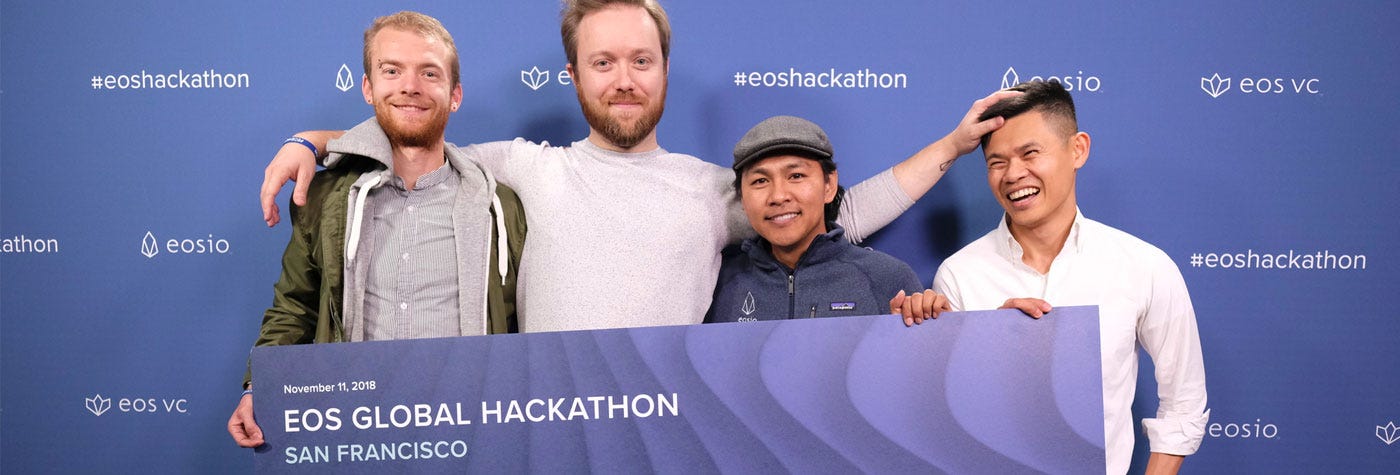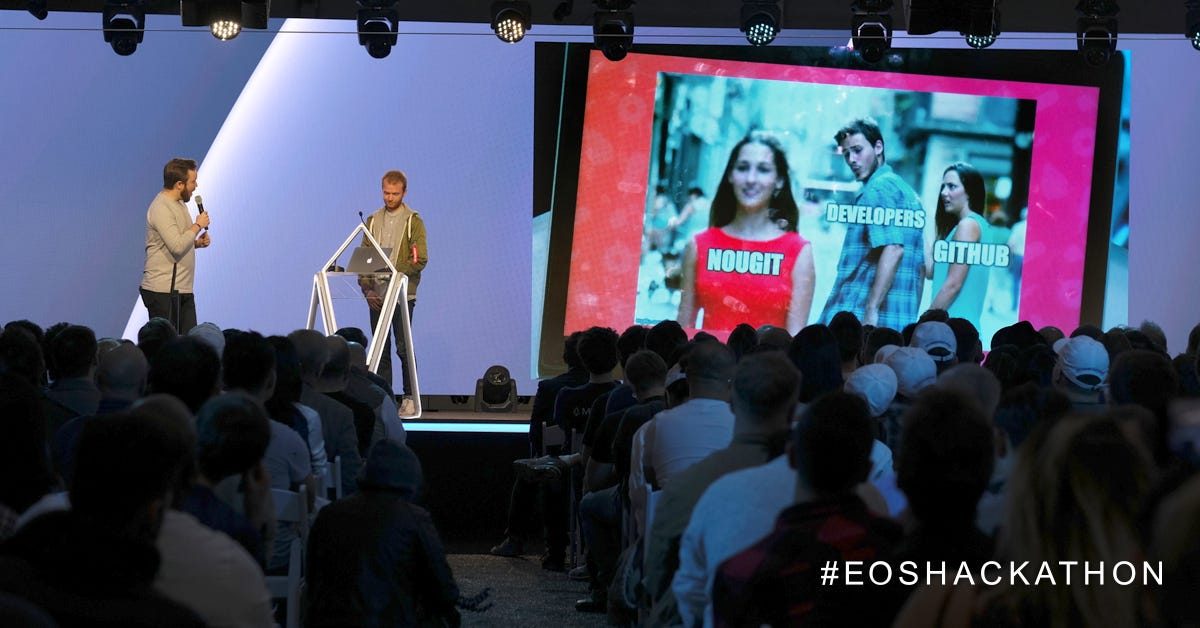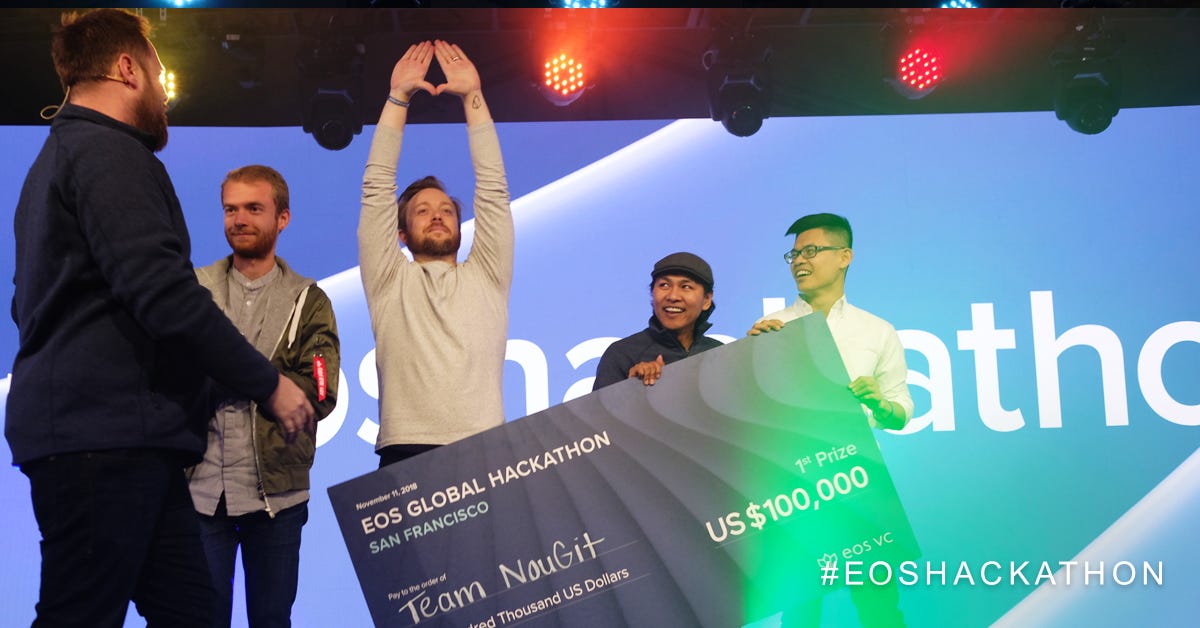
译文/Translated:
经常参加EOS会议的团队在旧金山的比赛中获得金奖,他们的应用符合项目经济和做出贡献的开发者的利益。
在软件开发领域,开源的概念是一个颇有魅力的概念。所谓的开源,就是允许任何一个IT开发人员构建和改进代码,从而造福所有的人。
这个理念是当代几大操作协议的基石,前有Linux,后有EOSIO.
但如果IT开发者为改进协议提出解法能够被给予奖励,这事怎么样呢?
这就是NouGit背后的团队提出的诱人的理念,NouGit是这个月初在旧金山举行的EOS全球黑客马拉松的冠军项目。
这次比赛的主题是创建一个EOSIO应用,使它能“协调各方所获利益和/或给用户带来更多财富”,NouGit在激烈的竞争中击败了其它74支队伍,获得了高达10万美元的冠军奖励。它们的项目是一个去中心化和有激励机制的Git存储库,即跟踪和协调文件和软件中源代码变化的系统。
“过去30年间,开源开发者一直是科技行业的支柱,NouGit将给这些开源项目本身带来财富,而不是让财富都流到微软或者IBM,”Rob Behnke说,是一个连续创业者,也是五大NouGit队伍的其中一员,他们将在下个月到南非的开普敦参加黑客马拉松的决赛。

比方说,最近几个月微软和IBM都达成了数十亿美元的收购案,购买了世界两大开源开发平台。其中,微软以75亿美元的价格收购了GitHub,而IBM以340亿的价格购买了RedHat。
然而,Behnke认为这些“中心化”模型不能使合作最大化。“去中心化才能让平台发展和推动开源的概念,”他这么说,他还认为NouGit的赏金计划符合项目经理和参与的开发者的利益。
在NouGit的生态圈中,当开发者写出某些具体的代码的时候,他们能获得奖励。“提出最好的解法的开发者可以获得赏金。所以,[这个解法的]价值就以补偿金和好名声的方式回馈给开发者。
Behnke还说:“这就可以大幅度减少雇佣摩擦,因为项目经理可以在付钱给开发者之前先看看这个开发者能干什么。在现存的模型下,很多开源项目吸引不了任何人参与建设项目。通过提出清晰的赏金,项目完成的可能就上升了。”
同时,在区块链上记录所有的代码上传和交易细节就产生了一个“去信任化”的环境,这就让所有的项目经理都得诚实起来。
Behnke和他的同伴—Colby Gilbert,Fred Madrid,Mike Lin 和 来自摩尔多瓦的NicoLae Carabut—结合了软件工程、加密学、金融科技和UI/UX设计的专业知识。他们对改进开源模型的关注既反应了他们通过EOSIO和旧金山更大的区块链社区形成了有机体,也反映了他们有志于挖掘区块链在社会和经济变革上面的潜能。最终的结果是一个从开发者的角度出发、为开发者考虑的项目。
“我们分布在美国各地,但是我们经常会在旧金山的区块链合作空间Starfish Mission里面见面,”Behnke说。“我们经常在EOS会议中见面,黑客马拉松前一个月,我们特地安排了几次会议准备组队参赛。”
他们报名参加这场马拉松的原因是“多找些乐子”。最后,“结果却大大出乎意料“。

那么,在他们筹备NouGit产品的过程中,有什么收获呢?“和正确的人组队,然后相信彼此,这就是我们获得的最大的收获,” Behnke说,他还说EOSIO是业内最“有感染力”的平台。
“We’ve had nothing but support and constructive feedback throughout to ensure we build this on the right trajectory,” he says. “And the hackathon mentors were the icing on the cake to help us push through and get across the finish line.”
“我们获得了极大的支持和极有建设性的反馈,这让我们一直在正确的轨道上,”他说,“同时,黑客马拉松上的导师们更是锦上添花,他们帮助我们取得突破、走到了最后。”标
原文/Original:
EOS meetup regulars too5k first prize in San Francisco with an application that aligns the interests of project managers and contributing developers
In the world of software development, the concept of open-source — which allows for any IT developer to build and improve on code for the benefit of all — is an ideal that is very appealing.
This concept has underpinned some of the most successful operating protocols available today, from Linux, right through to EOSIO.
But what would happen if IT developers were incentivized to build on the code, with rewards available for the solutions they found to improve the protocol?
That was the tantalizing scenario proffered by the team behind NouGit, the winning project at Block.one’s EOS Global Hackathon event in San Francisco earlier this month.
Challenged to build an EOSIO application that “aligns interests among stakeholders and / or drives more value back to users,” NouGit beat off stiff competition from 74 other teams to carry off the top prize of US$100,000. Their project is a Git repository — essentially a system for tracking and co-ordinating changes to source-code in files and software — that is decentralized and incentivized.
“Open-source developers have been the backbone of the tech industry for the last 30 years and NouGit is going to provide a way for open-source projects to create monetary value for themselves and not Microsoft and IBM,” says Rob Behnke, a serial entrepreneur and member of the five-strong NouGit team, who will now compete in the hackathon’s Grand Finale event in Cape Town, South Africa, next month.
By way of reference, recent months have seen Microsoft and IBM acquire two of the world’s largest open-source development platforms in multi-billion dollar deals. Microsoft bought GitHub for US$7.5 billion, with IBM paying US$34 billion for Red Hat.
Behnke believes these “centralized” models do not maximize the potential for collaboration, however. “Decentralization enables the platform to flourish and progress the open-source philosophy,” he says, explaining that NouGit’s bounty program aligns the interests of project managers and contributing developers.
In the NouGit ecosystem, rewards are offered for specific lines of code. “The developer who comes up with the best solution gets the bounty. Value is thereby returned to developers in the form of compensation and reputation enhancement.”
Behnke adds: “This greatly reduces hiring friction because it allows project managers to see what a developer can do before paying for their contributions. Under the existing model, a lot of open-source projects struggle to get anyone to work on their project. By creating clear incentives, the likelihood of project completions should increase.”
Recording all of these code submissions and transactions on the blockchain, meanwhile, creates a “trustless” environment that keeps project managers honest.
Together, Behnke and his collaborators — Colby Gilbert, Fred Madrid, Mike Lin and NicoLae Carabut, who is originally from Moldova — combine expertise in software engineering, cryptos, fintech, finance and UI/UX design. Their focus on improving the open-source model can be seen as a reflection of their organic formation via the EOSIO and wider blockchain community in San Francisco, and their passion for blockchain’s transformative social and economic potential. The end-result is a project that is very much designed from a developer perspective, with developers in mind.
“We assembled from all of us constantly seeing each other at Starfish Mission, the blockchain co-working space in San Francisco,” says Behnke. “We all kept running into each other at EOS meetups and then about one month before the hackathon there were a few specific meetups dedicated to assembling EOS hackathon teams.”
They registered for the EOS Hackathon with the intention of “having a ton of fun.” In the event, “expectations were drastically exceeded.”
So what lessons will they take away from the experience as they seek to make NouGit production-ready? “Putting together the right team and trusting your team-mates is one big lesson,” says Behnke, adding that the EOSIO community is the “most infectious” in the industry.
“We’ve had nothing but support and constructive feedback throughout toensure we build this on the right trajectory,” he says. “And the hackathonmentors were the icing on the cake to help us push through and get across thefinish line.”
原文链接/Original URL: